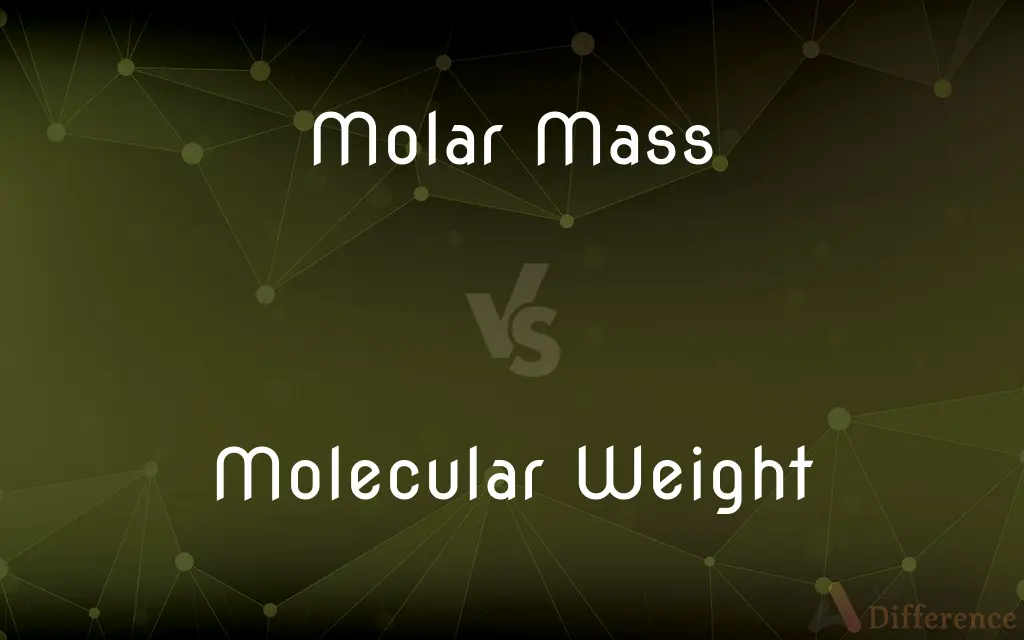Molar Mass vs. Molecular Weight — What's the Difference?
By Tayyaba Rehman — Published on November 15, 2023
Molar Mass refers to the mass of one mole of a substance in grams, while Molecular Weight is the sum of atomic weights in a molecule, often in atomic mass units (amu).

Difference Between Molar Mass and Molecular Weight
Table of Contents
ADVERTISEMENT
Key Differences
Molar Mass and Molecular Weight are both concepts related to the mass of molecules.
Molar Mass pertains to the weight of a single mole of a substance, usually expressed in grams per mole (g/mol). Molecular Weight, however, denotes the total sum of the atomic weights of the atoms in a molecule and is usually expressed in atomic mass units (amu).
Though the terms are sometimes used interchangeably, there's a subtle distinction.
Molar Mass is concerned with macroscopic quantities, linking the atomic or molecular scale to tangible, bulk amounts. Molecular Weight focuses on the microscopic scale, highlighting the mass of individual molecules relative to the unified atomic mass unit.
When scientists discuss the weight of large quantities of a substance, they typically refer to Molar Mass.
ADVERTISEMENT
For instance, chemists may need to know the molar mass of a compound to prepare solutions of a specific concentration. On the other hand, Molecular Weight is especially useful in theoretical contexts or when discussing individual molecules.
In practice, the numerical values for Molar Mass and Molecular Weight for a given substance are identical.
The difference primarily lies in the units and the scale of reference. While Molar Mass is referenced in grams on a macroscopic scale, Molecular Weight is usually described in atomic mass units (amu) on a molecular scale.
Comparison Chart
Definition
Mass of one mole of a substance
Sum of atomic weights in a molecule
Units
Grams per mole (g/mol)
Atomic mass units (amu)
Scale of Reference
Macroscopic
Molecular
Common Context of Use
Preparing solutions, stoichiometry
Theoretical chemistry, molecular discussions
Relation to Avogadro's Number
Direct (mass of Avogadro's number of molecules)
Indirect (mass of a single molecule)
Compare with Definitions
Molar Mass
The weight of one mole of a given substance.
The molar mass of water (H2O) is 18.015 g/mol.
Molecular Weight
The sum of the atomic weights of all atoms in a molecule.
The molecular weight of methane (CH4) is approximately 16 amu.
Molar Mass
The mass in grams of Avogadro's number of molecules or atoms of a substance.
The molar mass of sodium chloride (NaCl) indicates the mass of 6.022 x 10^23 formula units of NaCl.
Molecular Weight
A value used in theoretical discussions about molecules.
Molecular weight helps in understanding the size and composition of a molecule.
Molar Mass
The quantity in grams that equals the atomic/molecular weight.
The molar mass of carbon (C) is 12.01 g/mol, corresponding to its atomic weight.
Molecular Weight
An inherent property of molecules based on atomic composition.
Knowing the molecular weight aids in determining the molecular formula.
Molar Mass
A property used to convert between the weight and number of moles of a substance.
Using molar mass, we can determine how many grams are in a specific number of moles of a substance.
Molecular Weight
The mass of a given molecule compared to 1/12th the mass of a carbon-12 atom.
Using molecular weight, we can compare the weight of a molecule to a standard reference.
Molar Mass
A conversion factor between the number of moles and the mass of a substance.
To find the weight of two moles of sulfur, we'd use its molar mass.
Molecular Weight
A concept representing the mass of one molecule relative to the unified atomic mass unit.
The molecular weight of oxygen (O2) is approximately 32 amu.
Molecular Weight
Alternative spelling of molecular weight
Common Curiosities
Are Molar Mass and Molecular Weight the same?
They represent similar concepts but on different scales; Molar Mass is macroscopic, and Molecular Weight is molecular.
Why is Molar Mass significant in chemistry?
Molar Mass allows chemists to relate microscopic entities (atoms, molecules) to measurable, macroscopic quantities.
Is Molar Mass always larger in numerical value than Molecular Weight?
No, the numerical values are the same, but the units differ.
What units are used for Molar Mass?
Molar Mass is expressed in grams per mole (g/mol).
In what unit is Molecular Weight expressed?
Molecular Weight is typically given in atomic mass units (amu).
How is Avogadro's number related to Molar Mass?
Molar Mass represents the mass (in grams) of Avogadro's number of molecules or atoms of a substance.
What's the molecular weight of an atom?
It's the atomic weight of that atom, typically found on the periodic table.
Can Molecular Weight be a decimal?
Yes, Molecular Weight can be a decimal, reflecting the weighted average of isotopes.
Does Molar Mass change with different isotopes?
Yes, different isotopes of an element have different molar masses due to varying numbers of neutrons.
Can Molecular Weight be zero?
No, all molecules have mass, so their Molecular Weight is always positive.
How is Molar Mass calculated?
Molar Mass is calculated by summing the atomic weights of all atoms in a compound, using data from the periodic table.
Is Molar Mass affected by temperature or pressure?
No, Molar Mass is an intrinsic property of a substance and remains constant.
Why is Molecular Weight used in theoretical discussions?
Molecular Weight provides insight into the relative masses of molecules, aiding in theoretical and comparative discussions.
Is Molecular Weight essential for molecular formula determination?
Yes, knowing the molecular weight is crucial for determining a compound's molecular formula.
Does Molar Mass give insight into molecular structure?
Molar Mass provides information about the composition and size of a molecule but not its detailed structure.
Share Your Discovery

Previous Comparison
A4 Paper Sizes vs. Letter Paper Sizes
Next Comparison
Supermarket vs. Wet MarketAuthor Spotlight
Written by
Tayyaba RehmanTayyaba Rehman is a distinguished writer, currently serving as a primary contributor to askdifference.com. As a researcher in semantics and etymology, Tayyaba's passion for the complexity of languages and their distinctions has found a perfect home on the platform. Tayyaba delves into the intricacies of language, distinguishing between commonly confused words and phrases, thereby providing clarity for readers worldwide.












































